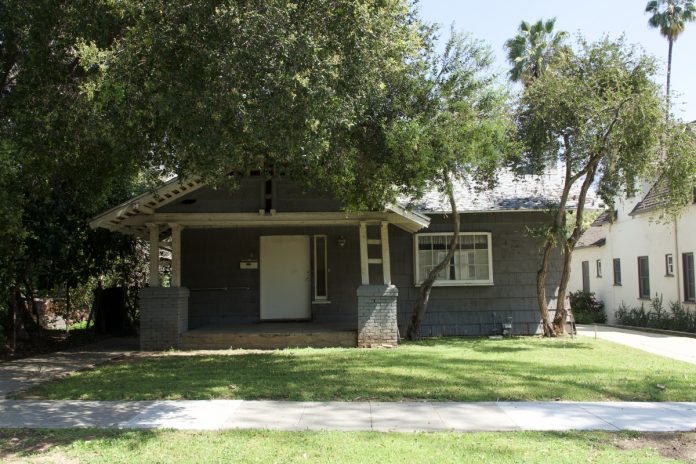The South Pasadena City Council is still waiting for Caltrans to send purchase and sales agreements (PSAs) for the 20 unoccupied properties the City wants to buy in the former SR-710 extension corridor.
Last July, a city consultant estimated the agency would release agreements for 13 non-historic homes Aug. 28 and those for 7 historic homes, September 11. But this week the City said it does not expect to get the SPAs until mid-to-late October.
Pursuant to SB 381 and a subsequent emergency rule-making, Caltrans offered the properties to the City June 30. South Pasadena filed timely, non-binding letters of interest, after which Caltrans was obliged to forward the SPAs. There is no statutory deadline, but Grant Henninger, principal of Mobius Planning of Anaheim, told the Council in July he thought it would take Caltrans 30 days after the letters of interest for Caltrans to forward the SPAs. Henninger is a sub-consultant to CivicStone, the Chico-based consultant which holds an $80,850 contract to develop the City’s Caltrans property acquisition strategy, explore funding sources and negotiate the SPAs.
South Pasadena Community Development Director Angelica Frausto-Lupo said CivicStone has helped to coordinate meetings with Caltrans “to review SB 381 timelines and purchase and sale process” and is “assisting with the residential inspection scope of repairs and cost of repairs.”
Once the SPAs arrive, the city will have 60 days to return executed agreements for any of the 20 properties it wants to buy. A Caltrans spokesperson did not offer a timeline for delivery the agreements but said the agency “is working with the city on next steps in the sales process, including sales contracts.”
At a minimum, next steps for the City include inspections and appraisals. Henninger told the Council the City would get access to the properties after sending its letters of interest, which it did over seven weeks ago. But the City–which two months ago authorized a $140,000 competitive contract with HBI Inspections of Chino Hills to inspect and estimate repair costs for the properties–still has not gotten access to any of the Caltrans houses.
The issue of access goes back months. In April, Council Member Diana Mahmud asked staff to send Caltrans a letter reminding them how important it is the City receive access to the properties before it sends the solicitation for the purchases, that is, June 30. The letter should emphasize “how we are really handicapped if we don’t have access prior to that date.”
Mark Gallatin, a board member of the South Pasadena Preservation Foundation, said he could think of no material adverse consequence due to the delay in the release of the SPAs. SPPF has a memorandum of understanding with the City to inspect the historic homes to identify their “character-defining features” and recommend repairs. Gallatin, who said SPPF has gotten access to several of the unoccupied homes, said SPPF hopes to inspect the properties at the same time as the city’s inspectors.
Under SB 381, the City can acquire the properties at the “reasonable sales price”—Caltrans original purchase price–and sell them for their fair market value. Caltrans offered 13 non-historic properties—including 11 single family homes, one multi-family residence and one vacant lot. The total “reasonable sales price” for these properties is $1.63 million. The 7 historic homes–6 single-family and 1 multi-family–total $263,700.
Gallatin has estimated the fair market value of the non-historic homes at $12.4 million, and of the historic properties at $9.2 million. That would leave the City with a gain of about $20 million. Also under SB 381, it must use the proceeds from the historic home sales for affordable housing—three units for each historic home. The proceeds will also be net of the cost to repair and bring the houses up to code—a figure which cannot be determined until the inspections take place.
It’s still undecided whether the City will bear the repair costs itself or reduce the sales price to the new owners, who unlike the City would not be required to pay prevailing wages to effect repairs.
The City has yet to disclose its financing strategy for the acquisition and CivicStone, which is contracted to explore the funding options, declined to comment.
The city is also considering whether to create a community land trust to administer the properties. On July 20, the council authorized issuance of a request for qualifications for a housing related entity to partner in such an approach, but Frausto-Lupo told the South Pasadenan the City does not intend to release the RFQ until after the properties are inspected.
Gallatin noted that on Sept. 12, the City had a meeting with residents and other stakeholders concerned about the recent occupation of two of the Caltrans houses, 885 Oneonta Dr. and 773 Bonita Dr., both of which are on South Pasadena’s shopping list. He said residents were told to call the South Pasadena Police about any concerns, as it can liaise with the State Patrol or Caltrans’ private security force, as appropriate.
He also said City Manager Arminé Chaparyan assured the group the City is “working on all fronts” including “behind the scenes” to secure the properties for the City, and to expect progress in the next few weeks.
“It was an encouraging message,” he said.















.png)







